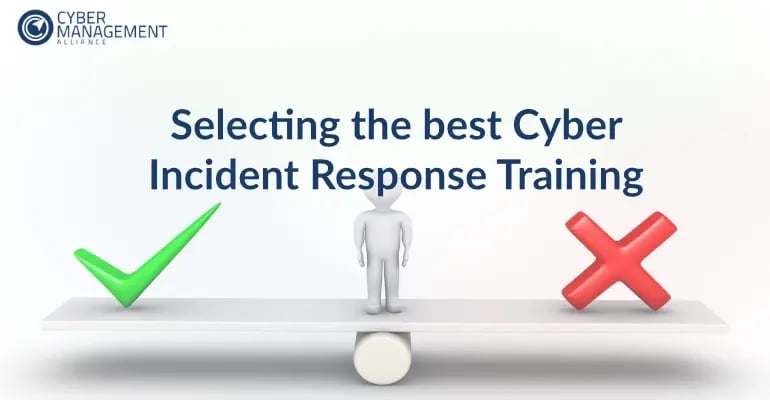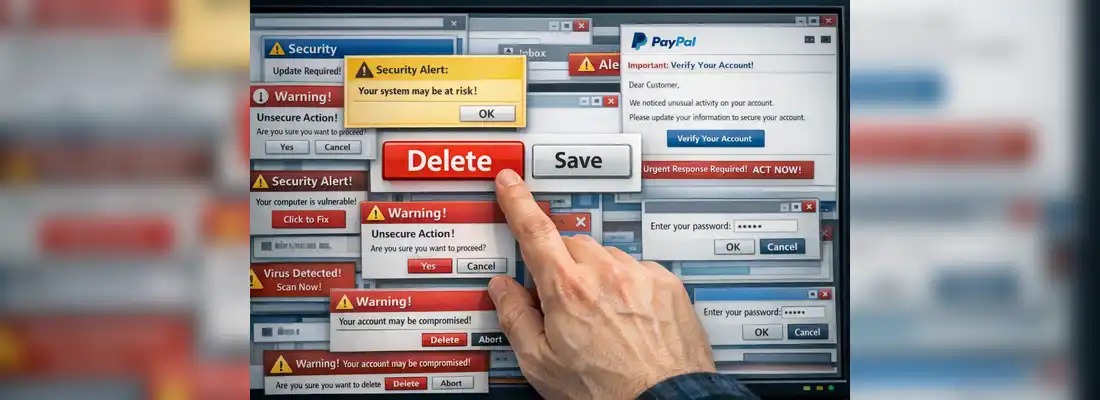How to Chose the Cyber Incident Response Training that's right for you
Date: 18 June 2020

Selecting the right type of cyber incident response training has never been this important. No organisation today is exempt from being vulnerable to cyber-attacks, which makes having a cyber incident response plan and training staff correctly most imperative.

In this blog, we help you identify the key things to look out for in a cybersecurity training programme before investing in one.
In the digital-first world that we inhabit, living without (1) a cyber incident response plan and (2) staff trained in cyber incident response is like walking around without a mask and a sanitiser in the current pandemic.
CAUTION: Not all cybersecurity training programmes are made equal and finding the best one for your organisation is critical to the success of the course.
Top 5 attributes of a great Cyber Incident Response course
1. The course content: This is quite a no-brainer, isn’t it? The online world is flooded with courses, not just on cybersecurity but everything under the Sun. Yet, it’s the course content that distinguishes the best. It is essential to find a cyber incident response course that covers the vital and relevant subjects in detail and also in easily consumable formats. Not just that, the content should be complemented with worksheets, templates, mind maps, exercises and checklists that suitably tax the grey-matter of learners and cajole them into testing what they’ve learnt.
The NCSC-Certified CIPR course offered by Cyber Management Alliance, for instance, doesn’t only have comprehensive modules covering key subjects like cyber resiliency, threat actors, Golden Hour management, defining normal, the cyber kill chain etc., it also offers a wide bouquet of bonus content including several worksheets and templates and a comprehensive supporting PDF book that learners can refer to long after they’ve completed the course. Further, the course also offers access to regular live discussions with global experts making the entire training experience a complete meal rather than just a measly appetiser!
2. Learning Objectives: Along with the course content, it is advisable for you to evaluate the learning objectives which the cyber incident response course has been designed to achieve. It is possible that they may not be relevant to your business or align with your company’s goals. At a basic minimum level, the CIPR course should be able to guarantee that at the end of it, learners will know the latest techniques in incident response, understand the cyber kill chain and how to lower discovery time, how to create fit-for-purpose plans and checklists, how to baseline “normal” within your organisation and the best methods that can stop 90% of attackers in their tracks before they are actually able to successfully breach a system. You can download a copy of the learning objectives of Cyber Management Alliance’s NCSC Assured Training Course.

3. The trainer: Any students’ (regardless of age) retention of and engagement with a subject depends a lot on the training style and knowledge of the teacher. Similarly, in cyber incident response training, the ability of the trainer to engage the learners and earn their respect is critical to the success of your investment in the course to begin with. Take a good look at the credentials of the trainer and ensure that your team will be able to look up to him/her before you zero in on the training programme.
The trainer of our NCSC-Certified CIPR training course, Amar Singh, isn’t just a world-renowned speaker and trainer, he also has a long history and experience in data privacy and information security. Amar has served as CISO for various companies, including News International (now News UK), SABMiller, Gala Coral, Euromoney and Elsevier. Amongst various other activities, Amar is a Global Chief Information Security Officer and Trusted Advisor to a number of organisations including an FTSE100 firm. His illustrious career not only earns him the instant respect and attention of learners but his informal and engaging style is what sets the course apart, leading to stellar outcomes for students.
4. Examination & Certification: While undergoing cyber incident response training on its own is highly commendable and useful in the current business landscape, many of your employees would want something to show for it. We, at Cyber Management Alliance, believe that examination at the end of a training course must be offered as an option to learners, especially to those for whom a certification could mean an immediate climb up the ladder.
Following the completion of our training course (Public, Internal, Instructor-led or Self Paced Learning) all students have the option of becoming certified in CIPR by successfully passing the APMG International examination of the NCSC-Certified Cyber Incident Planning and Response training. The exam is administered by APMG International and invigilated by ProctorU who provide secure live and automated online proctoring services for academic institutions and professional organisations. Upon successfully passing the exam, students earn our NCSC CIPR Digital Badge, issued by youracclaim.com - the world's most trusted digital credential network for professional associations and corporate learning. The badges are secure, digital representations of professional development credentials and can be easily embedded on an email signature, website, social media profile or a digital CV.
5. Flexibility: Finally, the CIPR course must offer adequate flexibility to learners. Firstly, it should be aimed at a wide audience including technical and non-technical professionals. Secondly, in terms of the format, we believe that the course should be consumable in any manner fit for your business. For example, our CIPR training course is available as a self-paced e-learning course, a live instructor-led online training course and as a private one or two-day internal workshop. Every business can pick and choose the format that suits it best in terms of budget as well as organisational requirement.



.webp)


